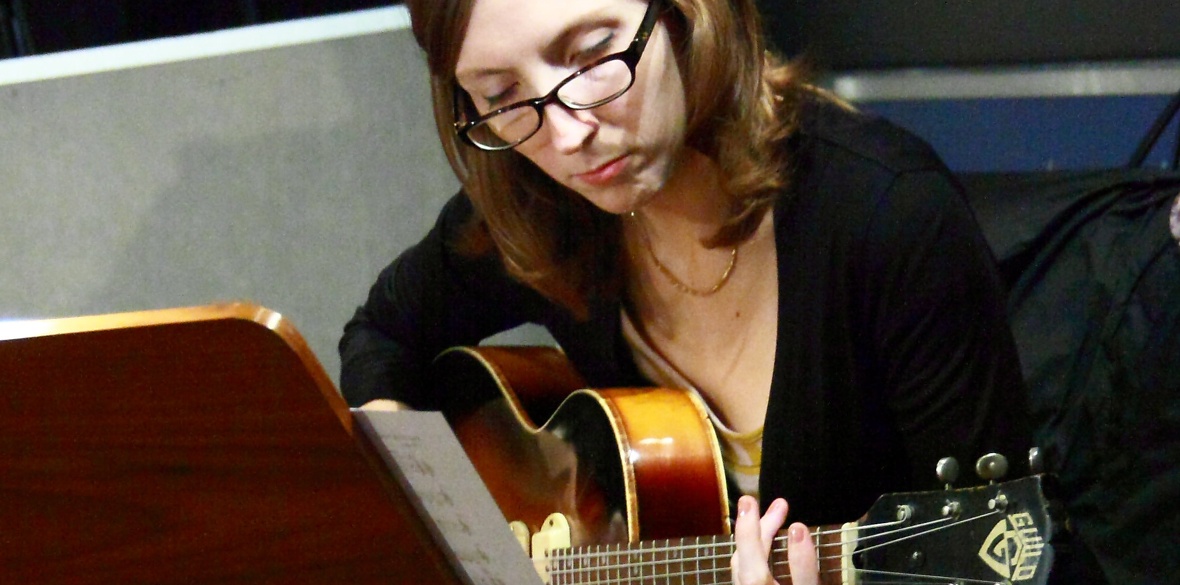This is the last article you can read this month
You can read more article this month
You can read more articles this month
Sorry your limit is up for this month
Reset on:
Please help support the Morning Star by subscribing here
MARY HALVORSON, born in Boston in 1980, her mother a nurse, her father a landscape architect, has become one of jazz’s prime guitarists.
She began on the guitar at 11 with early influences from Hendrix to the Beatles to Monk, Coltrane, Miles and Ornette, became interested in free improvisation at school and after studying with alto saxophonist Anthony Braxton has been “working as a musician my whole life.”
When I listened to her at Cafe Oto up close in 2018, I thought I could hear echoes of the blues. “You may be partially right,” she told me, “but I’ve never considered the blues to be a main influence — although my father used to play blues records of Robert Johnson and Lightnin’ Hopkins around the house as I grew up.” Perhaps more entered her musical bloodstream than she consciously thought.
Her new record with her band Code Girl is called Artlessly Falling. She uses diverse and cosmopolitan poetic forms — Ghazal from Arabic, the Malay quatrain of the Pantoum, the Japanese Haibun combining prose and Haiku, the Italian Sestina, French vers libre — as starting points for improvisation, with some marvellous musicians like saxophonist/vocalist Maria Grand, trumpeter Adam O’Farrill, bassist Michael Formanek and drummer Tomas Fujiwara.
Present too and singing on three tracks is the Morning Star’s old friend Robert Wyatt. Halvorson said of him: “It’s hard to put into words exactly, but his music hit me from the moment I first heard it. It’s so powerful, so deep, so unique. The beauty and emotional impact of his music really resonate and have helped through many difficult times in my life. His songwriting is just brilliant, unexpected, so uniquely his own.”
The tender sensitivity and discerning fragility of Wyatt’s verse peal through The Lemon Tree, Walls and Roses and Bigger Flames between Halverson’s crystalline guitar and the defiance and delicacy of the horns.
She told me that the poetic forms connect to her music. “They are inherently musical and once I write the poem in each form it becomes easy to create a song around it — the rhythm, structure and subject matter of the words inform the musical structure and mood of each song.”
She said how lucky she is to have such musicians playing with her. “They have strong voices and identities and are great improvisers, able to navigate seamlessly through different types of musical terrain.
“It’s been nothing but pure pleasure working with them. They help me to grow as a musician as we try to dig below the surface with improvising ideas that may be hard to put into words.”
Four days after Trump’s defeat I asked her about her poem Last Minute Smears on the album — her reflection on Trump’s Supreme Court Justice Brett Kavanaugh’s 2018 testimony to the US Senate, defending himself from a sexual abuse charge.
Was this a commentary on the curse of Trumpery and its defilement of justice? She responded by referring to now-times events: “I cannot even express to you the weight that has been lifted, both for me personally and for us as a country. I’ve slept well for the first time in weeks. Although there is much damage done, as you say, and a long path ahead of us, I am so thrilled that the four-year nightmare of Trump’s presidency will soon be behind us and hopefully we can get back to some semblance of democracy. And yes, I am feeling creatively optimistic.”









